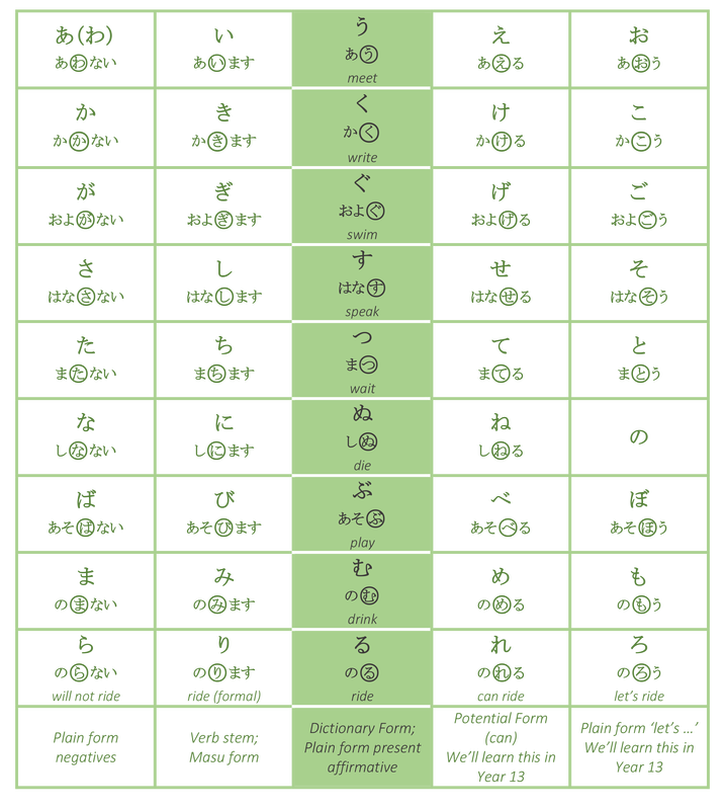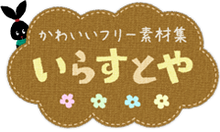At Level Two we deepen our understanding of the wonderful world of Japanese verbs. What's so wonderful about Japanese verbs, I hear you ask?
- Many ideas and nuances are communicated in Japanese simply by changing the ending of the verb; concepts like 'will/won't; can/can't; should/shouldn't; would/wouldn't; want to/don't want to' etc, which are communicated in English by adding one of these auxiliary verbs in front of the main verb. (We have already learnt some of the Japanese verb endings, e.g. たべたい - want to eat.)
- Even more exciting (yes, exciting!), is the fact that adjectives in Japanese behave just like verbs too, by changing their endings. e.g. あつい - is hot, あつかった - was hot.
So, let's begin by reviewing what we know about the three verb types:
All ichi-dan verbs end in -る, (but not all verbs that end in -る are ichi-dan verbs). Ichi-dan verbs often have only one syllable before the -る, such as みる、ねる. Also, the sound before the -る is always 'i' or 'e', as in the two previous examples, and たべる、おきる.
- Some text books refer to ichi-dan verbs as 'Group 2' verbs; other text books refer to them as 'ru' verbs. Ichi-dan verbs is the expression that Japanese people use for these verbs.
Observe how ichi-dan verbs behave in the affirmative and negative Plain Form and -Masu Form, and how theて form and verb-stem are formed.
みる - see/look/watch; たべる - eat (this basic form is called the 'dictionary form')
|
Plain Form Present/Future Tense (casual language)
|
Masu Form Present/Future Tense (formal language)
|
|
Verb Stem - just remove the final -る
|
-て Form - just remove the final -る and replace with -て
|
You will have observed that ichi-dan verbs are easy to work with. Just take off the final -る, and replace with the appropriate ending of your choice. This is why they are called ichi-dan verbs - because the final -る never changes to -ら, -り, -れ or -ろ, it just gets dropped and replaced. Unlike go-dan verbs (and most Japanese verbs are go-dan verbs :-)...
Like ichi-dan verbs, some go-dan verbs end in -る, but they also end in -う -く -ぐ -す -つ -ぬ -ぶ and -む. Let's look at how they behave:
- Some text books refer to go-dan verbs as 'Group 1' verbs; other text books refer to them as 'u' verbs. Ichi-dan verbs is the expression that Japanese people use for these verbs.
Verbs ending in う;e.g. かう - buy;あらう - wash
|
Plain Form Present/Future Tense (casual language)
|
Masu Form Present/Future Tense (formal language)
|
|
て Form - replace the final -う with -って
(Hint - take the plain past and change the final -た to -て)
|
Verb Stem - remove the final -う and replace with -い
(Hint - it's the -masu form without the -masu!)
|
Verbs ending in く;e.g. きく - listen/hear;あるく - walk
|
Plain Form Present/Future Tense (casual language)
|
Masu Form Present/Future Tense (formal language)
|
|
- Form - replace the final -く with -いて
(Hint - take the plain past and change the final -た to -て.)
|
Verb Stem - remove the final -く and replace with -き
(Hint - it's the -masu form without the -masu!)
|
Verbs ending in ぐ;e.g. およぐ - swim;いそぐ - hurry
|
Plain Form Present/Future Tense (casual language)
|
Masu Form Present/Future Tense (formal language)
|
|
て Form - replace the final -ぐ with -いで
(Hint - take the plain past and change the final -だ to -で.)
|
Verb Stem - remove the final -ぐ and replace with -ぎ
(Hint - it's the -masu form without the -masu!)
|
Verbs ending in す;e.g. はなす - speak;さがす - look for/search
|
Plain Form Present/Future Tense (casual language)
|
Masu Form Present/Future Tense (formal language)
|
|
て Form - replace the final -す with -して
(Hint - take the plain past and change the final -た to -て.)
|
Verb Stem - remove the final -す and replace with -し
(Hint - it's the -masu form without the -masu!)
|
Verbs ending in つ;e.g. まつ - wait;かつ - win
|
Plain Form Present/Future Tense (casual language)
|
Masu Form Present/Future Tense (formal language)
|
|
て Form - replace the final -つ with -って
(Hint - take the plain past and change the final -た to -て)
|
Verb Stem - remove the final -つ and replace with -ち
(Hint - it's the -masu form without the -masu!)
|
Verbs ending in ぬ;e.g. しぬ - die (sorry about the morbid example - this is the only verb that ends in ぬ!)
|
Plain Form Present/Future Tense (casual language)
|
Masu Form Present/Future Tense (formal language)
|
|
て Form - replace the final -ぬ with -んで
(Hint - take the plain past and change the final -だ to -で.)
|
Verb Stem - remove the final -ぬ and replace with -に
(Hint - it's the -masu form without the -masu!)
|
Verbs ending in ぶ;e.g. あそぶ - play/hang out;えらぶ - choose
|
Plain Form Present/Future Tense (casual language)
|
Masu Form Present/Future Tense (formal language)
|
|
て Form - replace the final -ぶ with -んで
(Hint - take the plain past and change the final -だ to -で.)
|
Verb Stem - remove the final -ぶ and replace with -び
(Hint - it's the -masu form without the -masu!)
|
Verbs ending in む;e.g. たのむ - order/request;たのしむ - enjoy
|
Plain Form Present/Future Tense (casual language)
|
Masu Form Present/Future Tense (formal language)
|
|
て Form - replace the final -む with -んで
(Hint - take the plain past and change the final -だ to -で.)
|
Verb Stem - remove the final -む and replace with -み.
(Hint - it's the -masu form without the -masu!)
|
Verbs ending in る;e.g. やる - do (casual);まもる - preserve/protect
|
Plain Form Present/Future Tense (casual language)
|
Masu Form Present/Future Tense (formal language)
|
て Form - replace the final -る with -った
(Hint - take the plain past and change the final -た to -て)
(Hint - take the plain past and change the final -た to -て)
- やる ― やって
- まもる ー まもって
So, why are they called Go (5) Dan (five step) Verbs? Let's take a look at this chart, and see if we can work it out.
Apart from that minor irregularity with いくin the -て form, there are only two irregular verbs: する (do) and くる (come). These verbs are so commonly used, that we have already learnt the irregular forms without being conscious of it.
する - do;くる - come
|
Plain Form Present/Future Tense (casual language)
|
Masu Form Present/Future Tense (formal language)
|
|
て Form
|
Verb Stem
(Hint - it's the -masu form without the -masu!)
|









